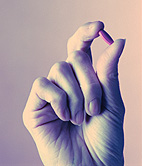Cure Rate for Experimental Hepatitis C Drug Tops 95 Percent
But high costs of newer medications is a concern, experts say.
Researchers report that an experimental drug has cured more than 95 percent of patients infected with hepatitis C, including some who failed other treatments.

If it wins approval from the U.S. Food and Drug Administration, this new drug, called ABT-450, could potentially compete with another innovative hepatitis C medication that costs $1,000 a day.
Nearly 3 million Americans have hepatitis C, a disease that can cause liver cirrhosis and cancer.
These newer, advanced treatments are better-tolerated and easier to take than interferon, the traditional standard treatment for hepatitis C, researchers say.
Interferon is no longer required to cure hepatitis C," said Dr. Stefan Zeuzem, a professor of medicine at the J.W. Goethe University Hospital in Frankfurt, Germany, and lead researcher on the ABT-450 study.
Hepatitis C is a big, bad problem. This new drug represents one among many breakthroughs in the ability to deal with hepatitis C.
An advantage to this treatment is that it is a pill, while interferon is given in weekly injections. Also, older treatments went on for a year, while this new therapy takes only three months to work.
Interferon treatment also has severe side effects, including fatigue and flu-like symptoms.
One drawback to the therapy is that some pills are taken once a day and some twice, which might make following the treatment tricky. Expert hopes that treatment eventually is simplified.
The major barrier is cost. Whether the new drug will be priced like Sovaldi, the $1,000-a-day medication, is still unknown.
With Sovaldi, the necessary three-month course costs $90,000, plus any other drug expenses and medical care.
Cost is even more significant in light of the millions of Baby Boomers who are five times more likely to be infected with hepatitis C than other adults, according to the U.S. Centers for Disease Control and Prevention.
For this phase 3 trial of ABT-450 -- typically the last trial needed for FDA approval -- nearly 400 patients were randomly assigned to take a placebo or a pill containing ABT-450 plus the drugs ombitasvir and ritonavir. These patients also took two additional drugs, dasabuvir and ribavirin. All patients had been treated before, but saw their diseases return or had a poor response or no response to treatment.
Taking the ABT-450 combination, 96.3 percent of the patients responded, the researchers said.
Previous research showed that patients who had never been treated also responded to this combination.
These new treatments, with their high cure rates, make it important to diagnose and treat hepatitis C early to prevent cirrhosis and liver cancer, expert said.
Hepatitis C can be spread by injectable drug use or sexual contact with an infected person. The U.S. Centers for Disease Control and Prevention recommends one-time screening for those born between 1945 and 1965 -- that's potentially millions of people who would qualify for treatment.
Source: U.S. Dept. of Health & Human Services
- 377 reads
Human Rights
Fostering a More Humane World: The 28th Eurasian Economic Summi

Conscience, Hope, and Action: Keys to Global Peace and Sustainability

Ringing FOWPAL’s Peace Bell for the World:Nobel Peace Prize Laureates’ Visions and Actions

Protecting the World’s Cultural Diversity for a Sustainable Future

Puppet Show I International Friendship Day 2020

